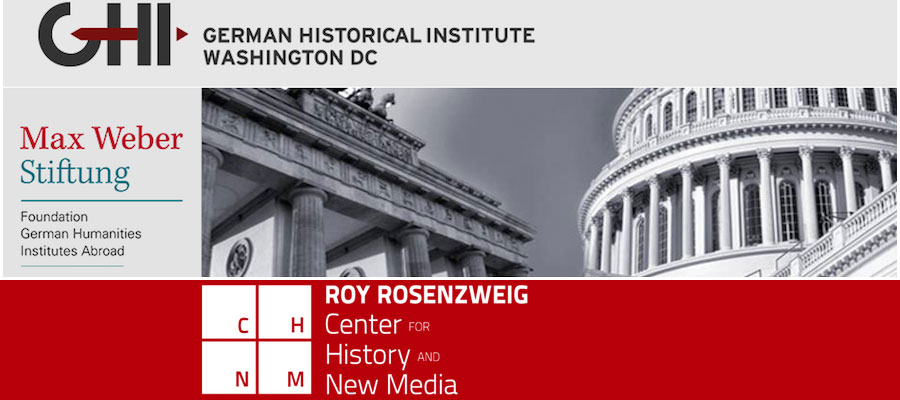With the generous support of the Gerda Henkel Foundation, the German Historical Institute (GHI) and the Roy Rosenzweig Center for History and New Media at the George Mason University (RRCHNM) invite applications from postdoctoral scholars and advanced doctoral students for a 12-month fellowship in digital history.
Over the last few years there has been a stunning growth of new and exciting digital tools and methods that have the potential to augment and revolutionize traditional historical research. Historians have turned to data mining, GIS, and social network analysis—to name just a few new digital tools—to analyze source material in innovative ways and to provide unique insights for their research. Scholars increasingly need to develop their own familiarly and facility with these new digital tools and approaches in order to take advantage of their potential for their research. As a means to build out that capacity, this fellowship is intended scholars who are perhaps new to digital history but are interested in developing new skills and methods that could aid their research as well as to support junior scholars already working in the field of digital history. Additionally, the fellowship aims to connect scholars from Europe to the digital history landscape in the United States.
The fellowship will provide a unique opportunity for the recipient to work on his or her research project at RRCHNM, where she/he will be in residence for one year. We welcome applications from scholars who are seeking seed-funding in order to develop a thrilling idea into a new project and/or funding proposal as well as from scholars who wish to pursue fully-fledged research projects. While at the Center, the fellow will also have the opportunity to collaborate with one of the Center's Associate Directors in order to develop the skills needed for his or her project, join teams working on projects in development at RRCHNM, and to sit in on graduate digital history classes at GMU. Depending upon qualifications and visa status, the fellow could teach or co-teach undergraduate courses involving digital history.
The fellow is also expected to cooperate with the GHI on a regular basis. She/he will participate in the Institute's scholarly activities and its digital projects. Moreover, the fellow will have the opportunity to get in contact with other North American centers for digital history or digital humanities. Depending on funding and approval, the fellow will also have the chance to organize a workshop on new perspectives in the field of digital history after completing the fellowship sponsored by the Max Weber Foundation - International Humanities.
A member institution of the Max Weber Foundation - International Humanities, the German Historical Institute Washington is a distinguished non-university affiliated historical research institute that conducts inter- and transdisciplinary research with a transatlantic focus. Its fellowship program promotes cutting-edge research in history and related disciplines and the international exchange of scholars. The GHI seeks to foster inter- and transdisciplinary cooperation and contributes to the advancement of digital history and digital humanities.
Founded in 1994, the Roy Rosenzweig Center for History and New Media at George Mason University is an internationally recognized leader in using digital media and computer technology to preserve and present the past; transform scholarship across the humanities; advance history education and historical understanding; and encourage popular participation in creating history. The Center collaborates with teachers, museums, libraries and archives, and university researchers, and trains graduate students though research assistantships and required courses.
Starting at the beginning of the 2018 GMU fall semester, the successful applicant will be in residence at the RRCHNM and will also participate in GHI activities, events, and digital projects.
Funding will be provided for a 12-month stay for postdoctoral scholars as well as advanced doctoral students, who are currently affiliated with a European research institution.
